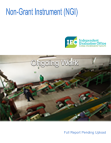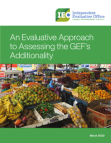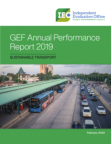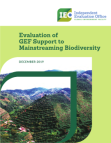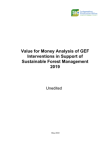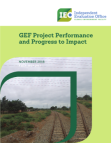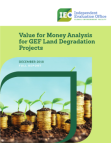With the selected criteria you have 61 - 70 of 208 results.
Non-Grant Instrument (NGI)
Status: Ongoing | Last updated on:
Evaluation Grouping: Institutional, Thematic
An Evaluative Approach to Assessing GEF's Additionality
Status: Published | Last updated on:
Evaluation Grouping: Institutional
Evaluation:
English
Annual Performance Report (APR) 2019 - Transportation
Status: Published | Last updated on:
Evaluation Grouping: Performance, Thematic
Evaluation:
English
Evaluation of GEF Support to Mainstreaming Biodiversity (BD) 2018
Status: Published | Last updated on:
Evaluation Grouping: Thematic
Evaluation:
English
Strategic Country Cluster Evaluation (SCCE): Small Island Developing States (SIDS)
Status: Unedited | Last updated on:
Evaluation Grouping: Country
Evaluation:
English
GEF Evaluation Policy 2019
Status: Published | Last updated on:
Evaluation Grouping: Institutional, Policies & Guidelines
Evaluation:
English
Value for Money (VfM) Analysis of GEF Interventions in Support of Sustainable Forest Management (SFM)
Status: Unedited | Last updated on:
Evaluation Grouping: Performance, Thematic
Evaluation:
English
GEF Project Performance and Progress to Impact (APR 2016)
Status: Published | Last updated on:
Evaluation Grouping: Performance
Evaluation:
English
Value for Money (VfM) 2016 - Analysis for GEF Land Degradation Projects
Status: Published | Last updated on:
Evaluation Grouping: Performance, Thematic
Evaluation:
English
Evaluation of the Multiple Benefits of GEF's Support through its Multi Focal Area Portfolio (MFA)
Status: Published | Last updated on:
Evaluation Grouping: Thematic
